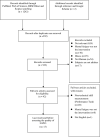Does mental fatigue affect skilled performance in athletes? A systematic review
- PMID: 34648555
- PMCID: PMC8516214
- DOI: 10.1371/journal.pone.0258307
Does mental fatigue affect skilled performance in athletes? A systematic review
Abstract
Background: Mental fatigue is a psychobiological state induced by a prolonged duration of demanding cognitive tasks. The effects of mental fatigue on physical performance have been well investigated in the literature. However, the effect of mental fatigue on skilled performance in sports remains unclear.
Objective: This study aimed to report a comprehensive systematic review investigating the carryover effects of mental fatigue on skilled performance among athletes.
Methods: A thorough search was conducted on PubMed, Web of Science, EBSCOhost (CENTRAL, SPORTDicus), and Scopus to select relevant literature, as well as on Google Scholar and sources of reference for grey literature. The selected literatures are centred on a mental fatigue protocol in which cognitive tasks are performed prior to athletic tasks. Only studies that used an experimental design to test two conditions, namely mental fatigue and non-mental fatigue, were selected.
Results: Eleven articles were chosen based on the selection criteria. Mental fatigue affects skilled performance in three sports: soccer, basketball, and table tennis. A decline in skilled performance (decreased accuracy, increased performing time etc) is relevant to impaired executive functions. Seven studies focus on offensive skills, whereas only two studies are associated with defensive skills.
Conclusion: Mental fatigue has a negative effect on various sports skills of high-level athletes, including their technical and decision-making skills; however, the impact is greater on offensive skills than that of defensive skills in terms of the role of athletes. Impaired executive functions may be responsible for the negative effects of mental fatigue on skilled performance.
Conflict of interest statement
The authors have declared that no competing interests exist.
Figures
References
-
- Allard F, Burnett N. Skill in sport. Canadian Journal of Psychology/Revue canadienne de psychologie. 1985; 39(2):294–312.
-
- Mooney MG. A Conceptual Model of Physical Performance in Australian Football. [dissertation]. University of Ballarat: 2012 [cited 2022 March 15]. https://core.ac.uk/reader/212996600
Publication types
MeSH terms
LinkOut - more resources
Full Text Sources
Medical


